Don't wanna be here? Send us removal request.
Text
Who are we?
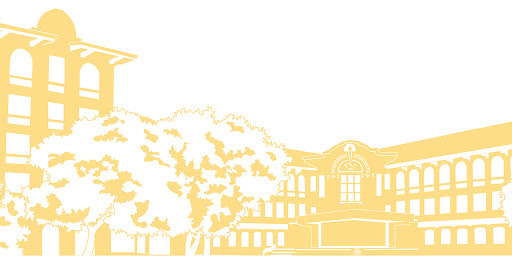
Hi! This is a group of 5 aspiring educators from the National Center for Teachers Education, Philippine Normal University under OBTEC 1-18. It aims to tackles the concepts, relevance, implications and actualities of the following topics:
(1) Education 4.0 and Industrial Revolution (2) Four Pillars of Learning (Delor’s Report) (3) John Dewey’s Democracy and Education
All the best, Enjoy!
0 notes
Text
Education 4.0 and Industrial Revolution
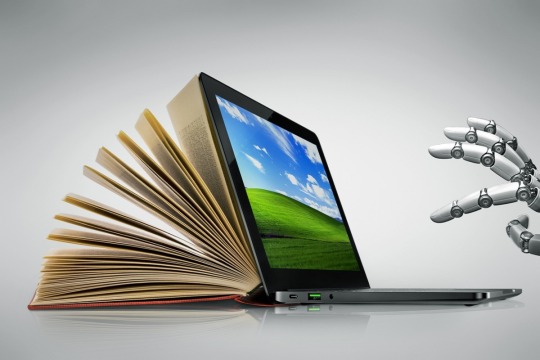
A.) SUMMARY
“Education opens up the mind, expands it and allows you to improve your life in so many ways”, this phrase basically explains the reason why education is interconnected with industry. Education is the dominant contributor to the individual’s development and preparation to the complexity of the world. Hence, education must also adjust and improve in order to sustain the need of society in terms of learning.
The book ‘Rethinking Education’ leads us to more relevant topics relating the importance of education to the industrial revolution. “Education is the key to the global integrated framework of sustainable development goals”, it is truly the key to the complexity and constantly changing of the world as it helps us to adapt to change. This book contains four parts that respectively explores relevant issues about Education 4.0. The first one is entitled ‘sustainable development’ which contains the ‘central concern’ in having the industrial 4.0 together with education 4.0, which was the societal problem and norms that are still a challenge to be faced. Hence, we need to research for new alternative approaches that could help us in the new trends, tensions, complexities, and new knowledge horizons brought by industry revolution. The second one is entitled ‘reaffirming a humanistic approach’. “The educators are the guide of the learners in the path of constantly expanding maze of knowledge”, but a teacher needs to have an effective approach in order to sustain the need of the learners. The principles of humanistic approach to learning will be a respond to the challenges brought to the revolution. The third one is entitled ‘education policy-making in a complex world’, it discusses the expansion of access to education worldwide over the past several decades is placing a greater pressure on public financing. Globalization is challenging us but we need to see the good of it and make the use of it because this is one of the reasons for the growing gap between employment and education.There is a growing gap between formal education and employment, hence, the formal education and the world of work needs to focus on the career-adaptive competencies as we evolve in to a new set of jobs given by industry 4.0. The last part was ‘education as a common good’ which discusses about how education and knowledge should be considered as a global common good as it was an individual’s fundamental right.
There is a need to re-contextualize the principles that govern the organization of education. The changes will happen and there are many questions to be considered and topics to be debated for more strategies and solutions to be made.
B.) ESSENTIAL, SIGNIFICANT AND RELEVANT FEATURES
Central Concern in Education 4.0 and Industry 4.0 “The changes in today’s interconnected and interdependent world are bringing new levels of complexity, tensions and paradoxes, as well as new knowledge horizons that we need to consider.” This industry revolution will bring challenges and tensions that should be long term or short term considerations. There will be ecological stress that could put poor countries at great risk as there will be unhindered growth, over-exploitation of natural areas, and increased natural disasters.
Human Rights: Progress and Challenges - there will be a growing interconnections as many things are more accessible to greater numbers of people throughout the world, but, there is a rising of ethnic, cultural, and religious intolerance. Hence, there is an aspiration to establish the rule of law and justice, but the challenge is how to ensure universal human rights through the rule of law,social, cultural, and ethical norms.
The Cyber World - We are now living in a connected world. The emergence and expansion of the cyber world has transformed how people access information and how could they interact with anyone. This gave us an expanded opportunities for freedom of expression and for social, civic, and political mobilization. These smart technologies are reshaping individual’s daily activity. The young people spend considerable time on their social media, exploring and enjoying the new forms of cultural and artistic expression with other people.
A Humanistic Approach to Education - “Sustaining and enhancing the dignity, capacity and welfare of the human person in relation to others, and to nature, should be the fundamental purpose of education in the twenty-first century”, this phrase implies the need for an integrated approach to education is relevant in today’s world that will be based on renewed ethical and moral foundations.
Reinterpreting and Protecting the Four Pillars of Education - The four pillars of education is one of the most influential concepts of the 1996 Delors Report. The learning to know, learning to do, learning to be, and learning to live together reflected the idea of the integrated approach to education. But as education re-contextualize, the pillars itself need fresh interpretation relevant in sustaining Education 4.0.
The Role of Educators in the Knowledge Society - Howbeit the fact that the modern day education will bring a huge impact on the future society, one of the struggles it will face in the process is the lack of knowledge of the educators because of the fact that they came from a different curriculum. In order for them to accomplish the big progress for the next generation, they must focus on seeing things in a wider perspective and be educated regarding this ideology. Even so, the educators of the modern academe were able to accomplish this task, which leads to a better understanding of the current learners. The Growing Gap between Employment and Education - Despite the fact that this concept will bring a good society for the future, it is a struggle for the current applicants who graduated years ago, they have to strive twice harder than how they already do in order to be flexible in the incoming system which is little by little applied every now and then. Howbeit the fact that there will be gaps in the process, it will soon produce a better and more fundamental outcome. Recognizing and Validating Learning in a Mobile World - The academe have various ways and methods for the past generations and it takes a lot of explanation for the ruling class to understand the concept of change via technology, however, as time goes by, the educational institutions are slowly starting to accept the flow and concept of the modern education curriculum, having better understanding and seeing the concept in a different and more understanding perspective will lead to a better flow. Validating the new concept gives the learners the ability to understand the things they want to learn even without the help of the academe itself, this gives the learners the opportunity to know things that is not taught to them in the school. Rethinking Citizenship Education in a Diverse and Interconnected World - Due to the generation gap, making the older people from the academe understand the concept of change takes a huge effort, they tend to seek comfort on the norms, however, they must understand that as the society evolves and tries to become better, it is very important for its people to have progress in various aspects in order to cope with the changes that is constantly occurring. Global Governance of Education and National policy-making - Since people are now having better access to millions of information worldwide, they are also becoming more knowledgeable, by this, they are having more information regarding the decision making process that will lead to a better country, despite the fact that a lot of information can be manipulated online, media and technology helps the people to know what they are going through and what they might go through with the choices they are about to make. Education and knowledge as a global common goods - Even after the fact that education is a very powerful foundation in the society, a lot of people are still taking it for granted. Luckily, as time goes by, the people are beginning to embrace education and began finding knowledge upon realizing its importance. The world is full of things we can't fully understand easily, however, they choice of knowing and choosing where to stand lies in our hands.
C.) IMPLICATION, IMPLEMENTATION AND APPLICATION TO PHILIPPINE EDUCATION
The Education 4.0 and Industry 4.0 will be a big challenge to the Philippines, especially the technology advancement that is the primarily focus in this revolution. In the 9th National Education Forum happened on 2019, PHILEXPORT President, Mr. Ortiz-Luis discussed the importance of different institutions and sectors in the advocates on education. On the other hand, PCCI Chairman for Education, Dr. Ong said that it is the government’s responsibility, and he noted that the breadth of jobs will be threatened by this technological advancement. Hence, there is a need of collaboration from all levels and all sectors to fulfill the mission of uplifting the quality of education in the country.
A study entitled Philippine Higher Education vis-a-vis Education 4.0 is a scoping review discussing about the insights about the status of Philippine higher education in transforming to education 4.0. It contains the strategies that will be use in improving the educational system of the Philippines, such as enhancing the research study in the country, advancement in technology, faculties, infrastructure, funding, governance and leadership with the support from educational public and private sectors. Based on the report of Technical Education and Skills Development Authority (2016), relevant reforms such as K-to-12 and the development of Philippine Qualifications Framework was established in order to be aligned with the global trends.
This is the first step towards the country’s preparation in industry revolution In the article Education 4.0:Rebooting Phl teacher education (2019), discussed the characteristics that Generation Z have. According to Dr. Rothman, iGen are more of having visual ability because of the constant exposure to ‘fast-paced’ and sensory laden multimedia environment, hence, Dr. Rothman estimated that the iGen learners have short attention span and only have seven to ten minutes in the classroom. There is a need to re-define and re-think teacher education in relation to the future as this will be a transition from a traditional learning system to a transformation.
REFERENCES:
Bokova, I.G. (2015). Rethinking Education Towards a Global Common Good. Retrieved from https://www.google.com/url?sa=t&source=web&rct=j&url=https://unevoc.unesco.org/e-forum/RethinkingEducation.pdf&ved=2ahUKEwj9spmtvdjqAhXGFogKHVPHCk8QFjAAegQICRAB&usg=AOvVaw0kFKeTPu5YIxkvr-hzuWnd&cshid=1595132977232
Export Development Council (2017) EDUCATION AND TRAINING: At the heart of PH 4.0 Economy. Retrieved from http://www.edc.net.ph/education-and-training-at-the-heart-of-ph-4-0-economy/?fbclid=IwAR03cIDgx2bHv1WzH_IF4uDb36ywMu-76YcCmcPBKqCNVsPIwZTmusUxZsM
Tawil, S. (2013) Revisiting 'Learning: The Treasure Within': Assessing the influence of the 1996 Delors Report. Retrieved from: https://www.researchgate.net/publication/319186139_Revisiting_'Learning_The_Treasure_Within'_Assessing_the_influence_of_the_1996_Delors_Report/citation/download
Hamdoni K. Pangandaman, Nassefah D. Ali, Joy Hope C. Lambayong, Mona Liza G. Ergas (2019) Philippine Higher Education Vis-À-Vis Education 4.0: A Scoping Review. Retrieved from: http://www.ijarp.org/published-research-papers/mar2019/Philippine-Higher-Education-Vis-vis-Education-40-A-Scoping-Review.pdf?fbclid=IwAR0Kx0FSXJSoNtIbYAjHDOQpaYYRcy2Qy4MYCN4WucY8cVxjs4p4Cg_S9K8
0 notes
Text
Four Pillars of Education (The Delor’s Report)
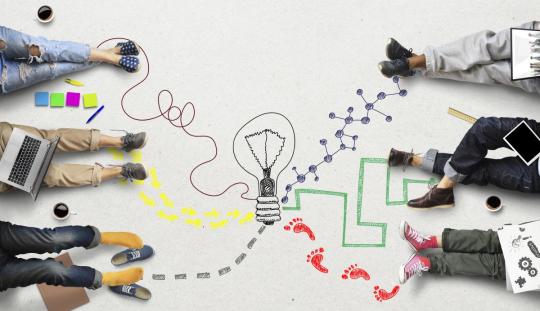
A.) SUMMARY
EVERYTHING ABOUT EDUCATION IS CHANGE
As we constantly face new phases in our lives brought by the outgrowing number of people that demands sustainable development in education, economic, social, ethical, cultural, civic and spiritual dimensions. The 21st century continues to develop educational policies that corresponds the complex and modern economies thus requires focus on the technical subjects such as instrumental skills, but before that we must understand the importance of humanities and social sciences or simply on how a single human being live.
When the traditional education was challenged, the 1972 Faure’s Report (Rethinking Education pg.14) established two interrelated notions of the learning society and lifelong education, the report stated that no one expect that someone’s initial education could serve them throughout their lives, being the school as the only essential means of transmitting knowledge rather it is one’s individuals right and necessity to learn on their own for their own development by the means of social life – social institutions, the work environment, leisure, and the media while the 1996 Delor’s Report (pg.15) proposed the vision of education into two concepts; ‘learning throughout life’ and the Four pillars of learning, to know, to do, to live together, and to be.
Learning to know, the first pillar means learning to learn, so as to benefit from the opportunities of education throughout life. Second pillar, learning to do, the ability to acquire not only the occupational skill but also the competency to deal with situation and work in teams. Learning to live together as the third pillar talks about the understanding of other people and the appreciation of interdependence— carrying out group projects and solving out conflicts in the spirit of respect, values, mutual understanding and peace. Lastly, learning to be as the holistic development of one’s personality, be able to act with ever greater autonomy, judgement and personal responsibility.
There is no simple solution to educational problems and placing Faure and Delor’s report in forefront will equip us in producing inclusive and equitable quality education for lifelong learning opportunities for all, Twenty-first century marks a new historical juncture, bringing it with different challenges and fresh opportunities for human learning and development.
B.) IMPLICATION, IMPLEMENTATION and APPLICATION TO PHILIPPINE EDUCATION
The world is changing—so as education. Every single day, societies indulge in the rapid changes and deep transformation that calls out for new forms of education that will foster the competencies that each member of the society needs to meet, today and tomorrow. Four Pillars of Education aims for the holistically learning of a person that encompasses more than the development of knowledge, skills, attitudes, and values throughout one’s life and a fundamental principle for reshaping 21st century education.
Learning to be seen not just as an intellectual process, but one that will establish all aspects of an individual’s life. The report presented formed as a framework that is being used in policy debates, teacher training and curriculum development worldwide. Along with UNESCO’s goal in adapting change and transforming the world we live in. The foundation for learning throughout life in a complex and rapidly changing world is in the quality of basic education.
Across the world, great progress in education is seen as it expands to learning opportunities for all. The Philippines is gradually dealing with the extensive reform and improvement of the educational system. Along with “Education for All”, it is also committed to pursue eight time bound and specific targets under the Millennium Declaration which it signed on September 2000. With the adoption of the Declaration, the Philippines likewise affirmed its commitment to the Millennium Development Goals (MDG) geared towards reducing poverty, hunger, diseases, illiteracy, environmental degradation and discrimination against women. (Philippine Education for All, 2015 pg. 2) Hence, reality issues that also needs to be resolved are the high dropout rates, high number of repeaters, low passing grades, lack of particular language skills, failure to adequately respond and address the needs of people with special needs, overcrowded classrooms and poor teacher performances.
Education alone can never solve these kinds of issues, but a humanistic and holistic approach to individual that will reflect in the society they belong in can possibly contribute to the new developmental model, We must find a way of responding to such challenges, taking into account multiple worldviews and alternative knowledge systems, as well as new frontiers in science and technology such as the advances in neurosciences and the developments in digital technology.
Rethinking the purpose of education and the organization of learning has never been more urgent as for the goal of inclusive and equitable quality education for all.
REFERENCES: Bokova, I.G. (2015). Rethinking Education Towards a Global Common Good. Retrieved from https://www.google.com/url?sa=t&source=web&rct=j&url=https://unevoc.unesco.org/e-forum/RethinkingEducation.pdf&ved=2ahUKEwj9spmtvdjqAhXGFogKHVPHCk8QFjAAegQICRAB&usg=AOvVaw0kFKeTPu5YIxkvr-hzuWnd&cshid=1595132977232
0 notes
Text
We THINK as ONE
#CollectiveReflection
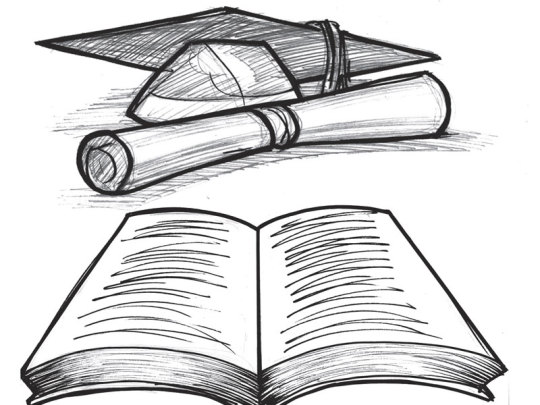
“THERE IS NO MORE POWERFUL TRANS FORMATIVE FORCE THAN EDUCATION.”
Benjamin Franklin once said “Tell and I forget, teach me and I may remember, involve me and I learn.” With these words, it reflects how method of learning affects one learner differently. Learning new things is not only about memorizing it, getting some words from it but certainly most of the learners learned by being involve or by simply doing it. That is why each of us have different method in order to learn, may it be in painting, learning how to sing and dance or learning some new cooking recipe. On the technical side, education in academe offers different styles for a student to learn.
In a formal education, different methods must be applied as well in order to gain the lifelong learning one must have. Learning to know, learning to do, learning to be together and learning to be are essential basis of education. These tools are commonly known as the four pillars of education that are considered as a guide in order to share the knowledge an educator has. Given these, an educator should be able to give an appropriate method in order for a student to learn and by these guide, it’s to be able to apply such knowledge and to used a new acquired skills. One effective pillars mentioned above is the learning to do which is experiencing and being involve in what you do in order to competently learn it.
On the other side, digital technology has been spread to various academe as a tool for learning. Now that the basic pillars has been taught, it’s now a challenge to step up for a different level of education since a lot has improved and changed since the first formal education. Using various platforms in the internet, sharing a word and basically learning a lot can be helpful in order to learn. The relationship between the technology and education can now be seen more often since a lot more people every single day learns how to simply be aware on what to do on a daily basis through media. Especially now that the new normal came, learning will now be more fond with the technology and an educator, for it to be effective, it must also learn and use the internet as efficient as possible. Since the Education 4.0 aligns with fourth industrial revolution, the use of technology is one great tool to give more significant information.
When an educator has used all the resources it has and were able to pass on what should we knew, may it be the content proper or some new technical skills. It is now the time to share what should be taught which is the knowledge that is more than the content base but rather the improvement of one’s self that reflects to the improvement of others. As John Dewey said, “Education is not a preparation for life; but life itself”, because it is believed that what taught in school should be a way to help the society and the world we live in. To change and to improve the world for the future generation— one good thing to think about as we try to study formally or informally. As future educators, it is important to engrave in their heart and minds the importance of gaining knowledge and acquiring skill which is greater to do when shared. After all, as Leo Buscaglia said, Change is the end result of all true learning.
“Change is the end result of all true learning”, it is also true that “the only constant in this world is change”, Hence, we should not be stocked on where we are right now, we should think for the future and use what we have on our surroundings. The next generation will be expected to respond to the needs of industry 4.0. They need to be confident with technology, and be continuously learning and self-improving individuals. Hence, the society needs to be prepared and improve education as it is the key for every individual’s knowledge on how to adapt and respond to the complexity brought by the industry revolution.
Industry needs education, whereas education needs educators and an effective approach in order to attain the goal of this revolution. Education is the desired approach to learning that aligns itself with the emerging fourth industrial revolution, as it helps us to adapt to changes and complexities in world that has impact in our daily lives.
Even though industrial revolution involves a lot of changes, this will become a game changer in the current students that are taking it at the moment. Despite the fact that industrial revolution takes a lot of effort and so much changes, we cannot deny the fact that in the near future, all of these changes that were implemented on the students will bear a huge impact in the near future. A lot of industries takes a lot of effort and this includes technological knowledge in order to produce better works and outcomes. This mode of learning are giving the learners the freedom to choose what they want to learn and in return, they will be able to experience various things that will not require a lot of interpretations and experiences from the academe. Having the freedom to choose gives the learners a better understanding of concepts which will result to better overall results. This will also gives the educators to determine the strengths and weaknesses of their learners. As per technology integration begins to expand, this will provide better opportunities to the learners because this will give them more relevance to a lot of perspective job opportunities. The impact of technology on the academe will not only transform the education system, but it will also change the way society perceives education. Education 4.0 will change the methodologies in order for them to be future ready. This move will take a lot of time and effort, but it will provide a better future for the society.
0 notes
Text
#AreYouUpForTheChallenge?
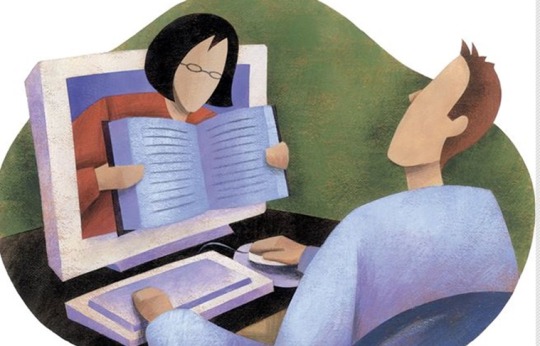
How are you going to demonstrate or inculcate balance between the tensions generated by societal change to your students?
As time passes by, the world changes so as to the world became bigger and bigger, different circumstances took on. These change affects not only the society we are living in, but also the education system and how students look on to what the education really is. One of the examples that the society had changed was the way we learn and read. We, as the 21st century learners, rely more on gadgets as a tool of learning. The Department of Education even suggested the use of online classes in substitute of face to face learning amidst this pandemic. As an educator, how are you going to manifest balance between these changes? Are you up for the challenge?
We cannot deny the fact that societal issues such as poverty and hunger affects education as a whole. Being an educator not only means that you teach students about the subject matter. Teaching as a profession is a lot more than that. Teaching these young minds to reflect in the environment they are living to may help them develop and discover methods that can affect and change the society. Showing them the percentage and rates of these issues globally and how these affect the country, may at least make them bothered, and in exchange, they may figure out some answers and solutions in reducing these rates. Responding to these matter by means of education may help. School as the meeting place of students to learn can help, but as to what on the first paragraph stated, amidst this pandemic, we are suggested to make use of online classes. Without students and teachers meeting face to face, as an educator, how are we going to expand and maximize the student’s knowledge about these issues?
As the world continues to acknowledge online platforms’ expertise, why don’t we take advantage of it through giving and spreading awareness about these societal changes? The online world is wider than we imagined it is. One click and it can reach thousands and millions of people. We can make advertisements or let out students make it for compliance, that pops whenever it wanted to, which contains awareness about these issues. There, it will not only reach students but also other people who is capable of viewing it.
Education alone may not fully resolve these kind of issues, but we can at least educate our students into these kinds of problems to concern them about how it affects their lives. Education is much bigger than you know it is. It is not only about how smart you are, but also how can you use what you learned in order to change the world.
0 notes
Text
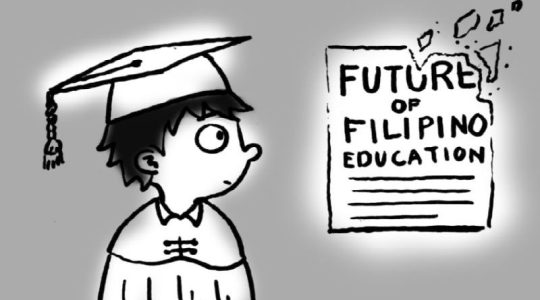
Is it education’s job to:
(A) Improve Society
(B) Develop Human Beings Full Potential
“Education is not a preparation for life; but life itself.” (Dewey, 1916) In Dewey’s book entitled Democracy and Education, he deeply emphasized the importance of education such as how this could improve society and develop the full potential of human beings. Dewey connected these two ideas by the word “formation”, in which he argued that the environment works to determine how the individual thinks and in return, how people chooses to behave. The environment he stated is the resources and ideas — that surrounds the learner — and the teacher — that facilitates learning — in which have both a significant role to the learners. Dewey highlighted environment as a crucial contributor on how a child learns. He argued, “The control is from behind, from the past.” (DE 76), in which he means that a child already learned from the environment he is in and this indicates what more a child can master and do. He also argued that this “past” played too strong on how new ideas the child would take in. These new ideas he brought out was the content or subject matter taught by the teacher. He also implied the pedagogical content learning, which he discussed as how teachers needed to have knowledge beyond their disciplines. For example, a math teacher should not solve problems based on one formula only, but he or she should formulate his or her own formula to make it easier for the learner. Dewey pointed out that in order to develop the full potential of a human, he or she needs to have other’s help or the “environment” he is talking about.
On the other hand, Dewey asserted that education could improve the society by which he talked about the vocational education. He said that it is not a training or preparation for work, but rather, is a choice to pursue a worthwhile course in life. He also connected it by the word “democracy” which he claimed that it does not only apply in a political system nor voting, but is equipping citizens the ability to take responsibility to make informed, intelligent choices and decisions leading to public good. He argued that pursuing vocational education can be the ground for “calling” in which a person can apprehend his or her social identity and develop themselves as a citizen. Dewey highlighted that vocational education can be a worthwhile investment on making the society better for living.
To summarize it all, John Dewey emphasized that education and democracy were two connected ideas that can enrich the society if worked together in a moral and social way.
In order to create better societies— education plays a very important part as it is not only about pointing out academic matters but rather a process of continuous learning that can be required at any time. It has help the world to change time to time and make it better since it helps an individual as a better citizen by teaching them to how to practice conduct by following rules and regulations and giving them a sense of conscience. It makes them think about the others— not only themselves. As Dewey requires the idea of being with the community you’re in to be able to learn, it has also increased the idea of being aware with the people you are with or the environment you are in.
In developing one’s potential, education indeed play a major part and took it as an opportunity to find the full potential of a human being. As an individual may have the idea of doing such thing, for example being able to explore the computer, it can be improved by having a formal education and being able to learn not just the basics but the in depth subject of the computer to make up even better ones.
Dewey also believed that ‘a new order of conceptions leading new modes of practices’ was needed in order to achieve even greater things. However, it is not only about having the formal education but rather the idea of education itself. An individual may acquire a skill by doing it— practicing it therefore, it is not only about getting formal education but being able to experience it and continuously learns from it as time goes by.
REFERENCES:
Pring, R. Martin, C. Winch, C. (2016) John Dewey's Democracy and Education: Questions for Education Toda. Retrieved from: https://www.philosophy-of-education.org/dotAsset/a1445ae8-b10c-4de6-bd0d-f4329891c42a.pdf
1 note
·
View note